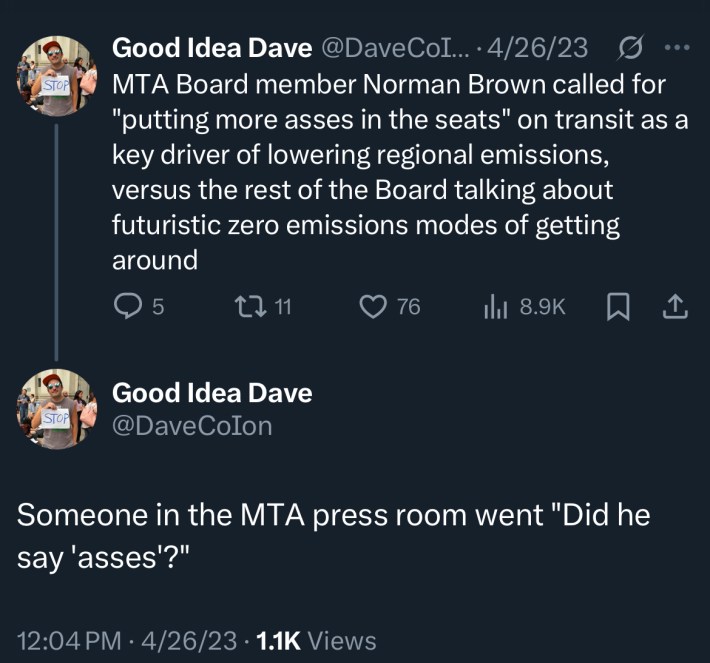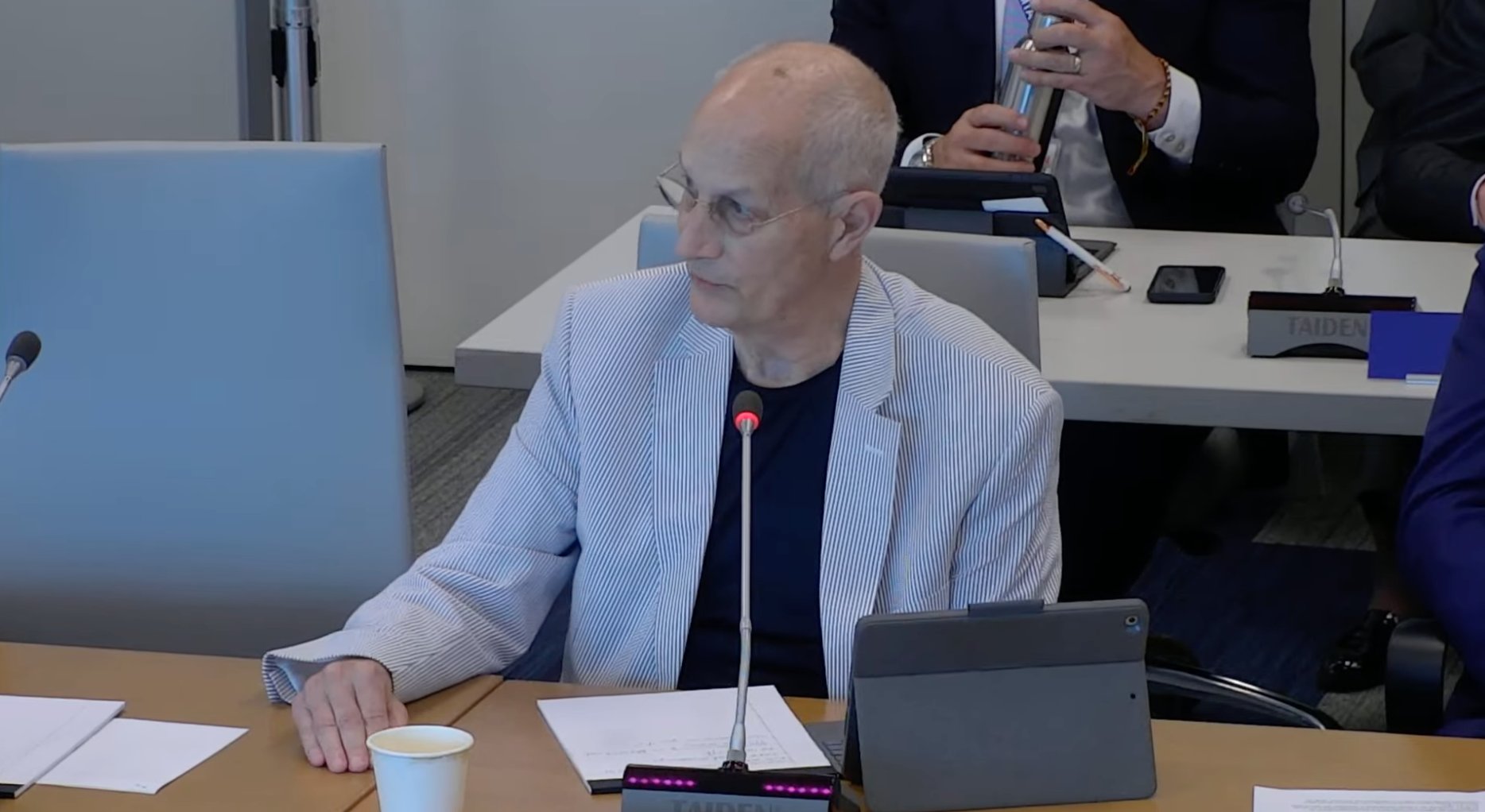The MTA Board, transit workers and the movement for better public transit said goodbye to a giant on Wednesday — as longtime labor rep Norman Brown retired after 20 years as the board's voice for Metro-North workers.
Brown leaves with a well-earned reputation as a deep thinker on transit, politics and everything in between. As a union leader, Brown is a passionate advocate for the people who make the system go — combining his experience as an Long Island Rail Road machinist with a scholarly devotion to how public transit works around the world and how to make it work better here in the Big Apple.
"As a person and board member, he unabashedly and deeply cared about everyday transit riders, transit workers and the MTA as a fabulous public resource," said Reinvent Albany Executive Director John Kaehny, who called Brown "a contender to be everyone's favorite New Yorker and favorite human being."
Since joining the board in December 2004, Brown was an imposing figure as someone with a deep well of knowledge in how to fix a train, how to plan the best way to use them and, crucially for his place on the board, how to argue for the interests of the people who make the MTA run.
But Brown's hallmark, like that of any good organizer, is relationships.
When this reporter started on the mass transit beat, people said he needed to know Norm, and Norm was gracious enough to sit down and share his lay of the land. Over lunch, Brown said that he used to ride his bike from home in Brooklyn to work at the Jamaica train yard.
Somewhere in one of my notebooks, I have scrawled notes from that lunch of some of his blunt assessments of how MTA management and various foes of transit labor didn't know how to get what they wanted out of unions, but what I learned at that and future lunches was that going out to eat with Norm wasn't a normal source lunch. Norm could pivot to soccer, various elements of European politics (something that came easy to him, given that he can speak and read Spanish, Italian and French) and then right back to city transit, which was the ostensible reason you were out to eat.
Tributes to Brown at Wednesday's board meeting lauded his understanding of what transit meant to the city and region.
"He knows what transit means to the region's economy, and he knows what it means to the people who work on the system," said Lisa Daglian, the executive director of the Permanent Citizens Advisory Committee to the MTA.
"He's incredibly smart, he's incredibly well read. He's got an incredible sense of humor, and he knows everybody."
Brown once described himself as having "a black belt in cynicism," but colleagues described him as the ultimate convener — someone who brought disparate groups together around shared goals. Brown played a key role in transit victories like congestion pricing and the MTA's federal rescue package during the depths of COVID.
Jon Orcutt, who's worked on transit issues in New York City for decades, said Brown is "very comfortable with a lot of different facets of public policy in a way that you don't see that often."
"When we put together the coalition to get the emergency funding for the MTA during the depths of COVID, Norman's contacts and his ability to open the doors for us of all kinds was really important," Orcutt said. "I have no idea all the key stuff he's done behind the scenes."
His skill was being able to advocate for workers and also rub elbows with people of all backgrounds, said Transport Workers Union International President John Samuelsen, another labor rep on the board.
"His reach went far beyond — into board members that wanted nothing to do with the unions," said Samuelsen. "He won them over with his intellect, something I never tried to do."
The two labor representatives may have different ways of approaching some issues — like congestion pricing — but had no problem bringing the hammer down together, like when they called former Cuomo board appointee Larry Schwartz on his garbage back in 2019.
"He had a different approach than me. I have a kind of, 'You're screwing us,' in your face, and 'I'm gonna fight back' approach," said Samuelsen. "And his approach was a little more 10,000 feet. He always had my back, there was 100 percent never a question about whether Norman would chime in to bolster my defense of MTA workers."
Brown didn't take up a lot of space in MTA board meetings, but he was worth listening to when he spoke up — eagerly cutting through euphemisms like "right-sizing" service to call them service cuts, or giving a blunt assessment of driving that ended with, "If you're not distracted you might not kill anybody."

It will also be hard for the next crop of MTA Board members to be as funny as Brown, would very casually, laconically liven up meetings with what to him probably seemed like a throwaway line but to everyone watching was blessedly outside the bounds of what you're used to there.

Norm's blutness is maybe not for everyone — but that's their problem.
When a klatch of anti-congestion-pricing Staten Island elected officials demanded Gov. Hochul remove him from the board because he said riders on the A train should get new subway cars before the benefits of congestion pricing accrued to those same elected officials, he shrugged it off.
"They'll be doing me a favor," he told the New York Post when the paper came calling for his reaction to the potential for being kicked off the board.
MTA CEO Janno Lieber said he always appreciated Brown's input.
"He has policy chops and brought a rare perspective to this board and its activities," Lieber said about Brown at the end of Wednesday's meeting. "As we all know from his somewhat infrequent but always searching participation in MTA board meetings, Norman is a truth teller. This is something that is really special in public setting. Norman is a truth teller, and he's unafraid to level with everybody and to do it without political sugarcoating."
Brown's very presence added much needed zest to MTA Board proceedings, which can be a hours-long drag for the reporters, advocates and MTA staffers forced to endure them.
"Even if Norm never opened his mouth at a board meeting, him being in the room would have imparted a sense of gravitas and connectedness that you can't forget about the tens of thousands of working men and women who are the MTA," said Charles Komanoff, a longtime friend of Brown's.
In his last remarks to the MTA Board, Brown put the working people he represented first, thanking the union leadership and workers at Metro-North for choosing him as their voice at 2 Broadway for 20 years, and also thanked the staff at the MTA who do behind the scenes work to keep the trains running.
"It's been a combination of the highest achievement in my professional life and the biggest pain in the ass that I have left," Brown said.
"I regret only that I'm not around to help you spend that $68 billion," he said, one last joke before he thanked people for laughing at his jokes for the last 20 years.






